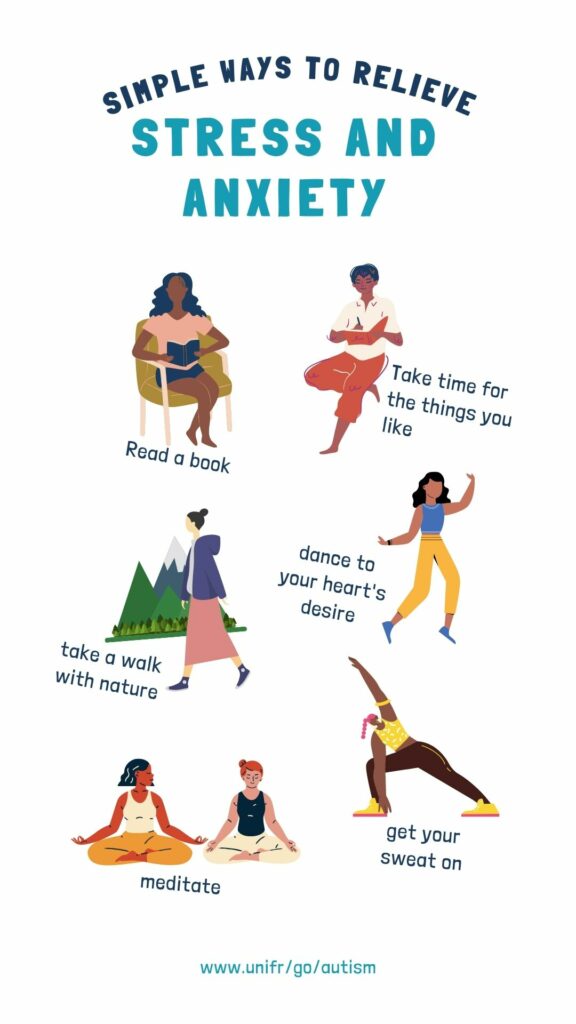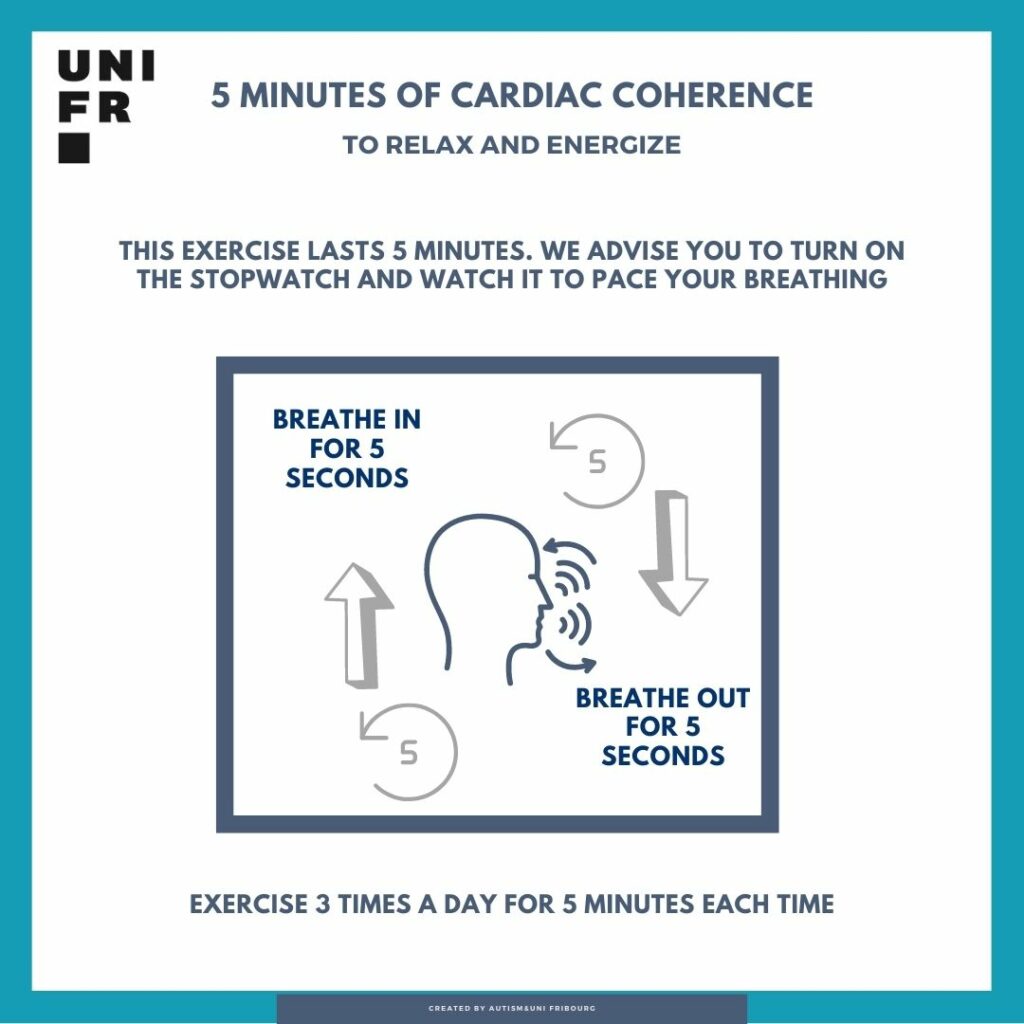Most students experience stress at the beginning of a course, during exams or when there are problems with other students, for example. This article presents some ideas on how to deal with it.
Context
Students in the Autism&Uni European survey listed the following things as stressful at university: choosing the right topic for a group assignment, sudden changes in schedules or instructions, exams, lack of support, noisy audiences, living in a shared apartment, sensory issues, lower than expected grades, traveling to and from university, adjusting to others, trying to feel like part of a group, public presentations, and interpersonal conflict.
Assignments with a long due date, such as Bachelor’s degree assignments, can also be particularly stressful. Indeed, they touch on common weaknesses of a lot of students: organization and planning, procrastination, motivation, confidence in one’s own choices. We will discuss below some tips on how to deal with these.
Conflict situations between students can be stressful and anxiety-provoking, especially for students with autism. The origins of a conflict situation can be diverse: a lack of awareness of autism, being seen as rude or unsocial, feeling abandoned by someone, experiencing social communication confusion (misinterpreting what someone has said, especially if it is sarcastic or ironic), having differences of opinion about hygiene to the flatmate, having to collaborate with colleagues who do not contribute sufficiently to the group work etc.
What does that have to do with me?
Many students experience problems with stress. Since people with autism tend to have higher levels of anxiety than others, it is important to know how to deal with these difficulties before they become too overwhelming.
Recognizing your stress level is the first step towards managing it. How does stress manifest itself in you? Do you feel pressure in your chest, sweaty hands, stomach ache?
The clues to a problem between friends or flatmates can be very subtle and require decoding non-verbal cues that are difficult to understand and unsettling for people with autism. Some examples include when your flatmate leaves the room when you enter, leaves ironic notes, for example on a pile of dirty dishes saying “Thanks for doing the dishes!”, looks up and sighs when you speak.
What is the next step?
Try some of the suggestions below to see what works best for you
Practical advice
Your pace of life will have a great influence on how tired or stressed you are, even during the exam period. It is useful to take care of yourself, to eat and drink healthily and to have a healthy lifestyle (e.g., get out in the sun, do sports, wash your clothes regularly, get enough sleep, have a regular sleep rythm, etc.).
- Live as healthily as possible:
- Get 6 to 8 hours of sleep per night or rest, even if you are having trouble sleeping
- Eat at least one proper meal a day with vegetables and protein a day
- Get enough fluids
- Limit caffeine, theine and other stimulants
- Exercise daily to relax muscles, use excess adrenaline and improve circulation
- Choose a stress management technique, such as:
- Cardiac coherence exercise
- Meditation
- Mindfulness
- Do things that make you feel good, for example:
- Playing or listening to music
- Art, crafts, DIY, drawing, etc.
- Enjoy your favourite food and drinks
- Make time for your special interest after a long day of study
- Go somewhere that calms you down: the library (see the list of quiet libraries), the fitness centre, or the swimming pool, the student halls, the forest or the park, outside for a walk, the study or computer rooms that are quiet, the coffee shops, etc.
- Use contacts, for example:
- A mentor, an academic coach or the Autism Unifr team
- Your psychologist or the the Psychological Counselling for students service
- Friends of the clubs and societies you belong to
- Friends outside the University
- Your family
- The Studies and Disability office
- Online forum friends for students with autism if you are one of them
- Manage the stress of exams:
- Visit the exam room before the day of the exam
- Allow enough time to get to the exams
- When you are seated in your seat, practice a relaxation technique for a few seconds before turning the exam sheet over
- Sit comfortably with legs and shoulders relaxed
- Before you start writing, look at the number of questions and points per question if indicated. You can then calculate the number of questions you need to answer in the time allowed by dividing the time by the number of questions. Take more time for longer questions
- If you are easily distracted by sensory stimuli, wear earplugs. If you contact the Studies and Disability Office in advance, you may be allowed to take your exam in a separate room
- Stay hydrated throughout the exam
- Breathe calmly for a few seconds at the end of each question
- Be pragmatic, clear, and concise in your answers
- Go to the next question based on the calculated time, even if you are not yet completely satisfied with your answer
- If you make connections between several ideas, make these connections explicit
- If you feel unwell during an exam, ask the invigilator if you can leave the room for a short time. A few deep breaths and a glass of water may be enough to calm you down.
- If you are ill on the day of the examination, please inform the departmental secretariat of your absence. You will then need to make an appointment with your doctor on the same day to obtain a medical certificate, otherwise your exam will be considered as failed
- It is common to have doubts about your performance after the exam. Whatever the result, congratulate yourself on having done all the work
- If you have to turn in printed work, make sure you allow time for technical problems with the printers
- If you are giving a presentation, make sure the projector is working and that your presentation is in the right format, or that you have the right plugs and adapters to connect your computer to the projector
- Tame procrastination
- “Free writing” can get you unstuck from a writer’s block, even if what you write is useless. Get into the habit of writing, for example, for 10 minutes every day. This will help writing become somewhat automatic
- Fill a Word document with headings, subheadings and bullet points. Turn them into paragraphs, then into separate sentences
- Motivation is closely linked to self-determination: take time to reflect on your choices: why did you choose this course of study, why did you choose this topic for your work? These reasons are important foundations that should make you believe in your idea
- Manage conflicts with other students:
- Do not try to resolve the conflict if you are upset or angry
- Talk about the situation with someone you trust who is not involved in the conflict
- Sometimes writing down what is troubling you can help you think through the situation and possible solutions
- Look at the situation from the other person’s perspective: is there a good reason why they behaved in a way that was upsetting to you?
- Speak to those involved from the point of view of your understanding (e.g., “It bothers me when the dishes aren’t cleaned, can we come to a consensus so that everyone is comfortable?” rather than “you don’t do your job”)
- Think about possible solutions and the ideal outcome of a conflict. Try to see if this vision is also good for the person you are in conflict with
- Disability Adjustments: the Studies and Disability Office will direct you to the various services available to you and will help you to find solutions if you feel that your autism is having an impact on your ability to complete an exam. Common adjustments include: extra time for exams, use of a computer for the written exam, taking the exam in a smaller, quieter venue than the main exam venue. These adjustments will be confirmed in an Examination Adjustment Plan and sent to those responsible for organising your examinations to make the necessary arrangements. You will find very useful information about these measures and the ethical reasons for including them in the university process in the chapter on disability adjustments. In principle, you will need to take the following steps:
-
- Ask your doctor for a medical certificate. This certificate must mention the diagnosis.
- If you were previously awarded reasonable adjustments at school or in college, have a copy of the decision ready.
- Please contact the Disability Studies if you feel you need any reasonable adjustment measures. You will be contacted by the Studies and Disability Office to adjust the measures to be requested from your faculty.
- Your request will be forwarded to the appropriate faculty – but not your diagnosis.
- You will receive the Faculty’s response to your request for the adjustments.
Questions to ask yourself
- What do I like to do at home to relax?
- Who can I talk to if I am feeling unwell?
- Where can I go during class days if I am feeling stressed?
- What is my favourite relaxation technique?
- What sports activity do I enjoy the most?
- What is my routine for getting to work?
- How do I justify my choices so that you I can fully assume them?
- What is my method for resolving conflicts?
Additional information
- Studies and Disability Office
- Psychological counselling for students
- Team Autism Unifr
- CONTACT
- CONTACT
About the author
Inspired by https://leedsbeckett.autism-uni.org/, edited by: Nathalie Quartenoud
Translated by: Daniel Dukes


 Back
Back 
